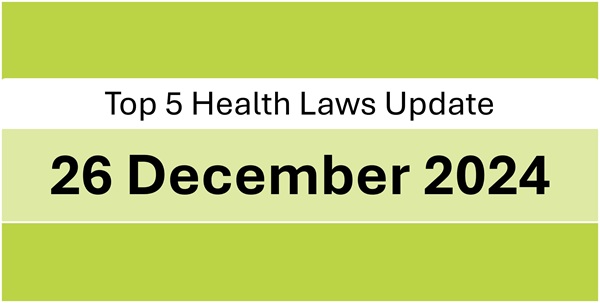Dear Readers, we are happy to share the most interesting legal and policy updates concerning health industry that we read today. We hope you enjoy reading it.
1. A Public Interest Litigation (PIL) has been filed in the Madras High Court, alleging that transgender clinics in Tamil Nadu are engaging in unethical practices. These include the use of the banned two-finger test and violations of established health guidelines. The court has issued notices to the National Medical Council and the Tamil Nadu government, seeking their responses to these serious allegations.
Source: bit.ly/4fCPFnA
2. The Indian subsidiary of a major U.S. pharmaceutical company is under investigation for violating the Uniform Code for Pharmaceutical Marketing Practices (UCPMP) guidelines by sponsoring foreign trips for 30 doctors. The government may take action against the company and the executive who signed the self-declaration of compliance. If proven, the doctors involved could lose their medical licenses and be prohibited from practicing medicine.
Source: bit.ly/409I4s3
3. India’s Allahabad High Court has overturned a National Consumer Disputes Redressal Commission (NCDRC) order that had mandated a compensation of ₹93 lakh from a doctor and hospital owner for alleged medical negligence during a C-section procedure in 2005. The High Court identified procedural errors in the NCDRC’s decision-making process, thereby nullifying the earlier order for compensation to be paid by the medical professionals involved.
Source: bit.ly/409s4pQ
4. India’s Karnataka High Court has granted temporary relief to pharmaceutical companies by directing the government to refrain from taking action against pharmaceutical companies producing nutraceuticals in drug-licensed units. This follows a challenge to Schedule M, which restricts the manufacturing of non-drug products in drug-licensed facilities
Source: bit.ly/40bT34c
5. The Jammu and Kashmir Medical Supplies Corporation Limited (JKMSCL) has ordered an immediate halt to the use of Bupivacaine Hydrochloride in Dextrose Injection USP (0.5%), 5mg/ml, 4ml ampoule, Batch Number AA40222, manufactured by Aishwarya Healthcare Ltd. This action follows a reported Adverse Drug Reaction (ADR) associated with the batch, which was manufactured in April 2024 and expires in March 2026. Medical officers have been instructed to cease using the affected batch immediately.
Source: bit.ly/408meFg


